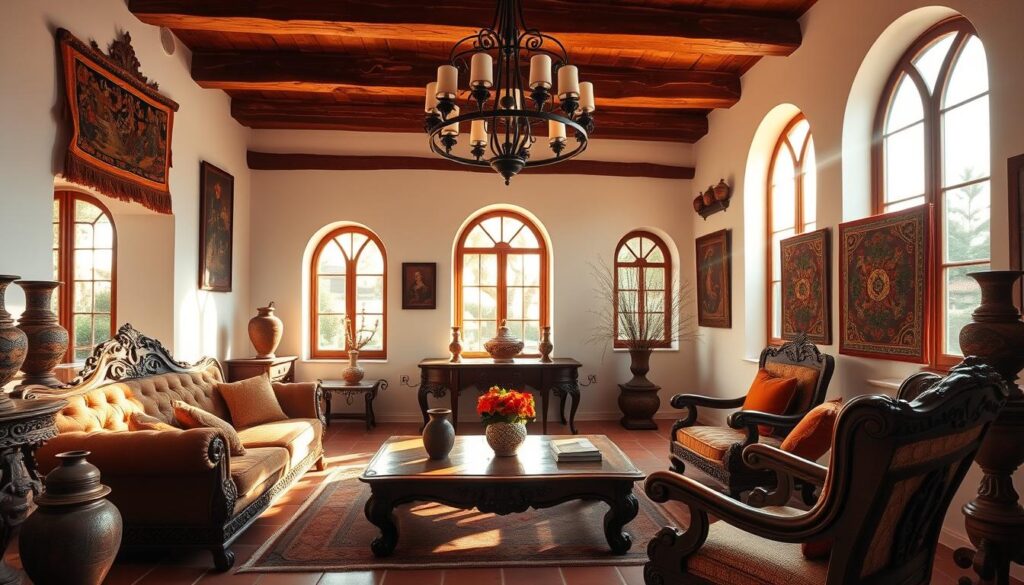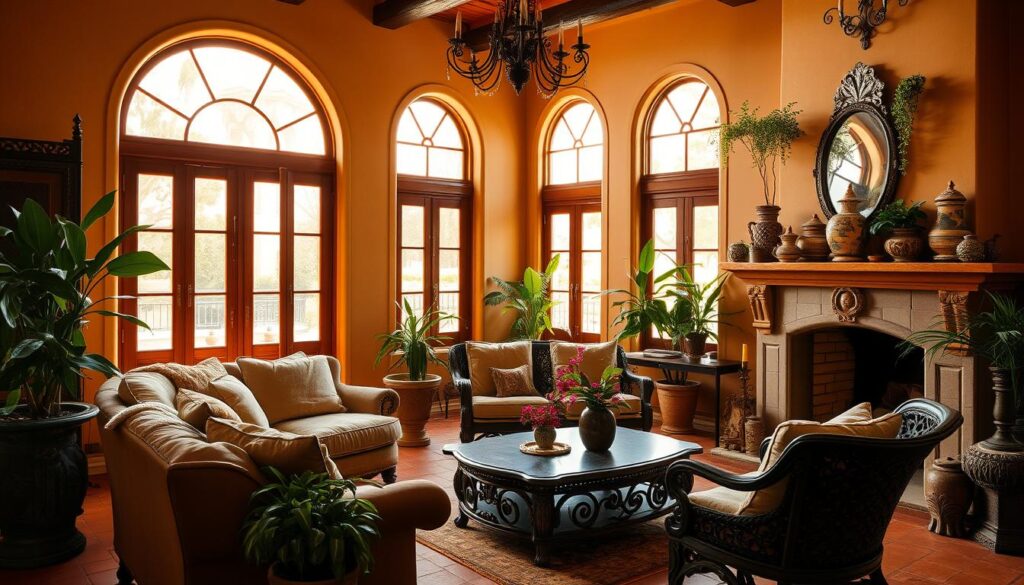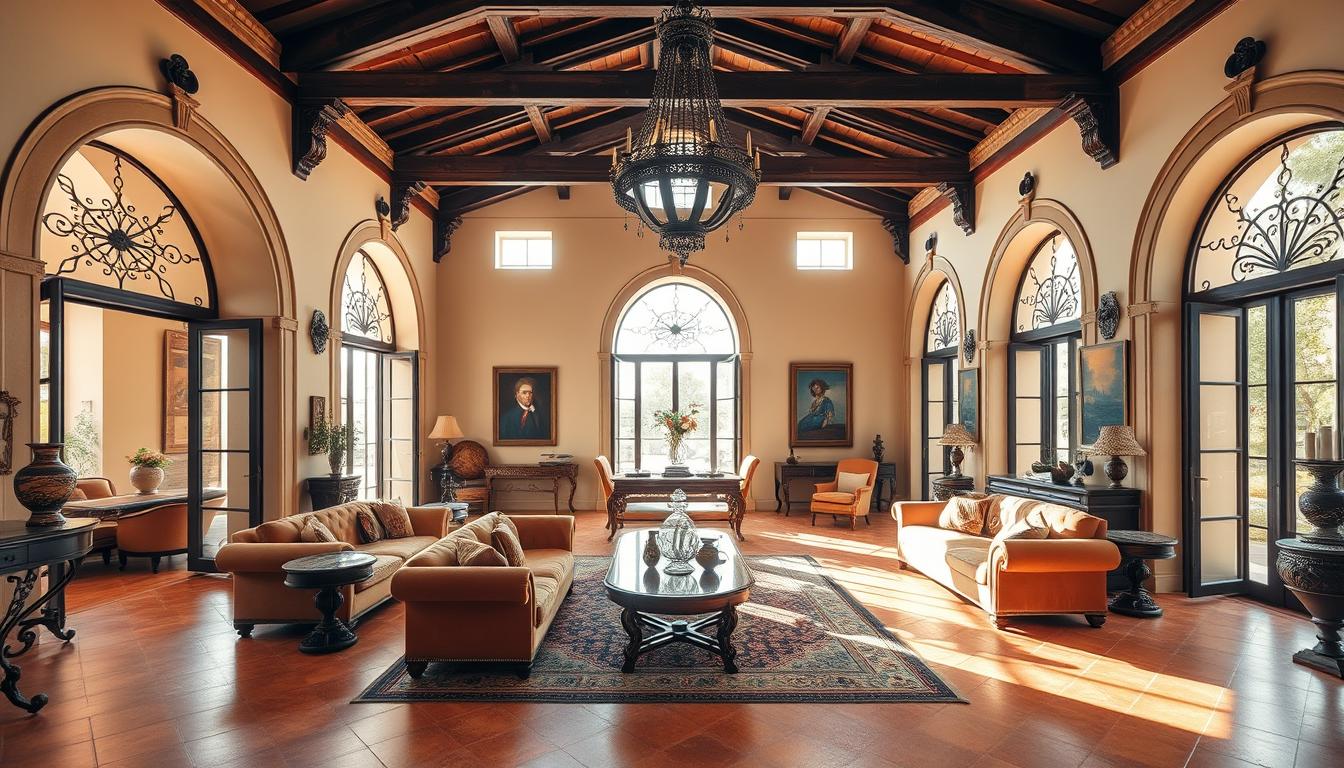Did you know homes with Spanish colonial home decor are getting more popular? They’re loved for their warm, welcoming look. This style uses earthy colors, fancy tile work, and wooden touches. It adds elegance and history to today’s homes.
We’ll look at how to make your home look Spanish-inspired. We’ll cover the key features that make this style stand out. By adding these elements, you can make your home feel cozy and beautiful.
Key Takeaways
- Understand the history and characteristics of Spanish-inspired interior design.
- Learn how to incorporate earthy tones and rustic accents into your home.
- Discover the importance of ornate tile work in Spanish colonial decor.
- Get practical tips on creating a cohesive Spanish-inspired living space.
- Explore how to balance traditional elements with modern decor.
Understanding Spanish Style Homes and Their Unique Charm
Spanish style homes have a rich history and blend different cultures. They are more than just buildings; they tell stories of the past and present.
Key Characteristics of Spanish Architecture
Spanish homes stand out with their stucco or adobe walls, giving them a natural look. Curved lines and arches make them elegant and smooth. The terra cotta roofing adds warmth and durability.
The homes also feature intricate tile work, inspired by Moorish designs. This adds beauty and shows the cultural history of Spanish architecture.
Historical Influences on Spanish Design
Many cultures have shaped Spanish design, including Moors, Goths, and Renaissance Europeans. The Moorish occupation of Spain is seen in the detailed tile work and ornate details. This mix of influences creates a unique and beautiful style.
The Gothic period added pointed arches and ribbed vaults. The Renaissance brought classical elements like symmetry and proportion. These elements enrich Spanish architecture.
Popular Regions Known for Spanish Style Homes
Spanish style homes are found in many places, but California and Florida are famous for them. These areas have warm climates and a history tied to Spanish colonization.
Spain and Mexico also have many Spanish style homes. Each place has its own unique take on this architectural style.
The Importance of Color Schemes in Spanish Interiors
The color palette is key in Spanish interior design. It makes spaces warm and welcoming. Choosing the right colors is essential for a true Spanish-inspired home.
Warm and Earthy Tones
Warm and earthy tones are typical in Spanish design. Terracotta, sienna, and golden brown make spaces cozy and inviting. These colors add warmth and comfort to your home.
To use these colors, think about terracotta tiles and earth-toned ceramics. Wooden furniture with a warm finish also works well. For example, a terracotta wall paired with contemporary Spanish home design elements creates a beautiful mix.
Accent Colors for a Vibrant Look
Warm and earthy tones are the base, but accent colors add vibrancy. Turquoise, cobalt blue, and deep red are great for adding color and interest.
To use accent colors well, balance them with earthy tones. A turquoise vase or cobalt blue ceramics can brighten a room with warm tones. Here’s a simple guide to balancing your color scheme:
| Earth Tones | Accent Colors | Result |
|---|---|---|
| Terracotta, Sienna | Turquoise, Cobalt Blue | Vibrant yet Warm |
| Golden Brown, Beige | Deep Red, Emerald Green | Rich and Inviting |
By mixing warm tones with vibrant colors, you can make a Spanish-inspired interior. This balanced approach is crucial for a harmonious and modern Spanish decor that showcases Spanish style homes.
Incorporating Textures in Spanish Style Design
To capture the essence of Spanish interiors, mixing textures is key. Textures add depth and warmth, making a room feel cozy and real.
Ideas for Textured Walls and Ceilings
A rustic Spanish style house is known for its textured walls and ceilings. Stucco and plaster finishing give a genuine touch. Wooden beams, rough or smooth, bring a warm, earthy vibe typical of Spanish design.
- Stucco and plaster finishing for walls
- Exposed wooden beams for ceilings
- Use of natural stone for added texture
| Texture Technique | Description | Effect |
|---|---|---|
| Stucco Finishing | A traditional method using lime and sand | Earthy, rustic look |
| Wooden Beams | Exposed or decorative beams | Warm, cozy ambiance |
The Role of Fabrics in Creating Ambiance
Fabrics are vital in traditional Spanish home interiors, shaping a room’s feel. Rich fabrics like velvet, linen, and heavy tapestries add texture, warmth, and interest.
To boost Spanish charm, think about adding:
- Velvet drapes or upholstery for a luxurious feel
- Linen or cotton textiles for a lighter, airy texture
- Tapestries or embroidered fabrics to add cultural depth
By carefully choosing textures for walls, ceilings, and fabrics, you can make a traditional Spanish home interior that’s both authentic and welcoming.
Furniture Choices that Define Spanish Style Interiors
The heart of Spanish style interiors is in the furniture. It mixes old charm with new elegance. Choosing the right pieces is key to capturing Spain’s rich culture and architecture.

Traditional Furniture Elements
Traditional Spanish furniture is known for its detailed carvings, curved shapes, and plush upholstery. These features add authenticity and warmth. Essential pieces include:
- Ornate Wooden Furniture: Wooden beds, wardrobes, and dining tables with intricate carvings are must-haves.
- Velvet and Silk Upholstery: Rich fabrics with detailed patterns make furniture feel luxurious.
- Wrought Iron Accents: Wrought iron adds a rustic elegance to frames, lighting, and decor.
Contemporary Spanish-Inspired Furniture
Modern Spanish-inspired furniture brings a new look with clean lines and simple shapes. Mixing old and new creates a welcoming space. Some modern ideas include:
| Furniture Piece | Characteristics | Benefits |
|---|---|---|
| Simplified Wooden Furniture | Clean lines, minimal carvings | Creates a sense of openness and simplicity |
| Modern Upholstery | Bold colors, geometric patterns | Adds a contemporary touch, creates visual interest |
| Hybrid Wrought Iron Pieces | Combines traditional wrought iron with modern designs | Blends heritage with modernity, adds uniqueness |
Mixing traditional and modern furniture creates a Spanish villa interior that’s both true to its roots and modern. The goal is to balance ornate details with simpler designs for a space that feels both inviting and harmonious.
Lighting Solutions to Enhance Spanish Charm
Lighting is key to bringing out the Spanish charm in homes. It can make a space feel warm and welcoming, just like traditional Spanish homes.
Types of Lighting Fixtures
Spanish homes often have ornate lighting that adds to their charm. Some favorites include:
- Wrought iron chandeliers
- Sconces with intricate designs
- Table lamps with ceramic or metal bases
These lights do more than just illuminate. They also decorate the space, enhancing its look.
| Lighting Fixture | Description | Style |
|---|---|---|
| Wrought Iron Chandeliers | Ornate and decorative, often featuring curved lines and intricate details | Traditional Spanish |
| Sconces | Wall-mounted fixtures that add warmth and ambiance to a room | Classic Spanish |
| Table Lamps | Versatile and functional, available in a range of materials and designs | Modern Spanish-inspired |
Natural Light and Spanish Architecture
Spanish architecture loves natural light. It uses big windows, courtyards, and open layouts to let in lots of sunlight.
To bring more natural light into your home, think about:
- Installing larger windows or skylights
- Using mirrors to reflect natural light
- Creating an open floor plan to allow light to flow freely
By mixing natural light with the right lighting fixtures, you can make your home feel warm and inviting. This is the essence of Spanish style homes.
Flooring Options to Complement Spanish Style Homes
Flooring is key in Spanish-inspired design. There are many options to match this style. The right flooring makes Spanish style homes warm and inviting.
Terracotta and Saltillo tile are top picks for Spanish style homes. They’re loved for their rustic look and lasting quality. These tiles look great and are easy to care for, even with lots of foot traffic.
Tile Flooring: A Timeless Choice
Tile flooring, like terracotta, has been around for ages in Mediterranean areas. It’s loved for its natural beauty and how well it fits with Spanish design. Terracotta tile flooring brings a cozy feel to any room with its earthy tones.
“The use of terracotta tile flooring is a nod to the traditional Spanish architecture that has influenced design for centuries.”
Hardwoods and Their Rustic Appeal
Hardwood flooring is also great for Spanish style homes, adding a rustic touch. Oak and pine are favorites because they’re strong and beautiful. Hardwood flooring makes a room feel cozy and welcoming.
Choosing between tile and hardwood flooring depends on your home’s needs. Both have their benefits. Your choice should match your home’s design and your taste.
By picking the right flooring, you can make your Spanish style home even more beautiful. It will be a warm and inviting space that shows off the charm of this classic design.
Outdoor and Indoor Flow in Spanish Design
Spanish design is special because it mixes indoor and outdoor spaces. This style makes homes feel connected to nature. It uses elements that blend indoor and outdoor areas, making homes look and work better.
Embracing Indoor-Outdoor Living
Indoor-outdoor living is key in Spanish home design. Homes have big windows, sliding doors, and large patios. This makes moving between inside and outside easy. It also lets in natural light and air, making homes feel better.
Key Features of Indoor-Outdoor Living:
- Large windows and sliding glass doors
- Expansive patios and outdoor living areas
- Seamless transition between indoors and outdoors
Courtyards and Their Significance
Courtyards are big in Spanish design. They are private outdoor spots for relaxing or having fun. These areas are tucked away by the home, offering peace and quiet.
The Role of Courtyards:
| Feature | Description | Benefit |
|---|---|---|
| Private Outdoor Space | Surrounded by the home’s structure | Provides seclusion and tranquility |
| Decorative Element | Often includes fountains, plants, and ornate tile work | Enhances the aesthetic appeal of the home |
| Functional Area | Can be used for dining, relaxation, or entertainment | Increases the home’s living space |
By adding courtyards and embracing indoor-outdoor living, homes become truly Spanish-inspired. They become places that are both beautiful and useful.
Accessorizing Your Spanish Style Home
To complete your traditional Spanish home interiors, add decorative elements that echo Spain’s rich cultural heritage. Accessorizing is key to creating a warm and inviting atmosphere that shows your personal style.
Focus on artwork and decorative accessories when accessorizing. These elements can add authentic touches to your Spanish-style home, making it feel more cohesive and polished.
Artwork that Reflects Spanish Heritage
Artwork is a great way to infuse your home with Spanish charm. Consider pieces that reflect Spanish heritage, such as:
- Spanish colonial art, which often features intricate details and vibrant colors.
- Works by Spanish artists, which can add a touch of authenticity to your decor.
- Traditional Spanish motifs, such as Moorish patterns or Baroque designs.

When selecting artwork, think about the overall aesthetic you want to achieve in your home. For a more modern Spanish decor, you might opt for contemporary pieces with a Spanish twist.
Decorative Accessories for Authentic Touches
In addition to artwork, decorative accessories can play a significant role in creating an authentic Spanish atmosphere. Some ideas include:
| Accessory | Description |
|---|---|
| Spanish pottery | Colorful, hand-painted ceramics that can add a pop of color to your space. |
| Wrought iron decor | Intricately designed ironwork that can be used for lighting fixtures, wall decor, or other accents. |
| Textiles | Vibrant fabrics with traditional Spanish patterns, such as flamenco dresses or embroidered linens. |
By incorporating these elements, you can create a Spanish-style home that feels both authentic and inviting. Whether you’re drawn to traditional Spanish home interiors or modern Spanish decor, the right accessories can make all the difference.
Plants and Natural Elements in Spanish Interiors
To make your home feel like a Spanish villa, add plants and greenery. This not only makes your space look better but also brings the outdoors inside.
Plants like olive trees and succulents are great for Spanish homes. They do well indoors and add a rustic feel.
The Role of Greenery in Spanish Design
Greenery is key in Spanish interiors, making them warm and welcoming. It helps blend indoor and outdoor spaces, a Spanish design hallmark.
Using plants also shows the importance of indoor-outdoor living in Spanish culture. Courtyards in Spanish homes often have lots of greenery, setting a standard for indoor spaces.
Choosing the Right Plants for Indoor Spaces
When picking plants for your Spanish-style home, choose ones that do well indoors and need little care. Some good choices are:
- Olive trees, which add a Mediterranean charm
- Succulents, known for their hardiness and low maintenance
- Bougainvillea, which can be trained to climb or trail
- Lavender, offering a fragrant and rustic appeal
To make your Spanish-inspired interior even more natural, add terracotta pots, woven baskets, and natural textiles.
| Plant Type | Characteristics | Benefits |
|---|---|---|
| Olive Trees | Evergreen, drought-tolerant | Adds Mediterranean charm, symbolizes peace |
| Succulents | Low maintenance, varied shapes | Thrives in indoor conditions, aesthetically versatile |
| Bougainvillea | Vibrant flowers, climbing habit | Adds color, can be trained to climb or trail |
By adding plants and natural elements thoughtfully, you can make your Spanish-style home warmer and more inviting. It will show off the beauty of Spanish villa interior design.
Bringing It All Together: Creating Your Spanish Oasis
Making a Spanish-inspired home is about mixing old and new styles. We need to balance colors, furniture, and more to make a welcoming space.
Cohesive Design Essentials
Warm and earthy tones are key for a unified look, typical of Spanish homes. Rich textures in furniture, flooring, and decor add depth and interest.
Personalizing Your Space
Adding personal touches makes our home unique. In a Spanish home, this could be vibrant art, decorative items, or green plants. These elements bring our space to life.
By mixing these elements, we create a beautiful Spanish-inspired home. It feels both real and welcoming.



